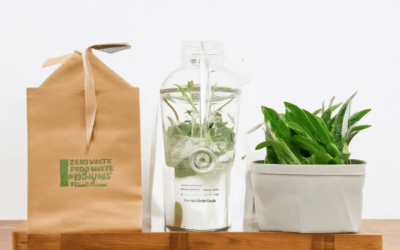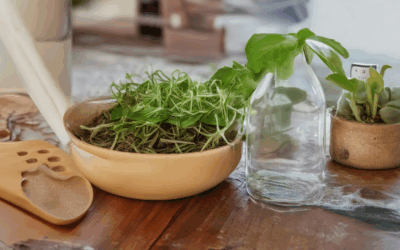As spring arrives, so does the annual ritual of spring cleaning. While traditional methods are often effective, many come with environmental trade-offs that can leave you feeling guilty or concerned about your household’s impact. This year, consider embracing eco-friendly spring cleaning tips that not only freshen up your space but also align with a more sustainable lifestyle. From reducing chemical exposure to conserving resources, adopting eco-friendly cleaning practices can make a meaningful difference. Whether you’re a seasoned green cleaner or new to the concept, there are plenty of ways to tackle your spring cleaning routine with the environment in mind. Discover simple strategies, effective products, and sustainable habits that can transform your household routine while promoting a healthier planet.
Key Takeaways
– Adopt sustainable practices to reduce waste, such as using reusable cloths, composting kitchen scraps, and recycling old items.
– Opt for natural, biodegradable cleaners like vinegar, baking soda, and essential oils to enhance cleaning effectiveness safely.
– Conserve resources by optimizing water use and unplugging electronics during cleaning sessions.
– Minimize exposure to harmful chemicals by choosing non-toxic alternatives and avoiding ammonia or chlorine-based products.
– Create DIY cleaning solutions and repurpose items like towels and cardboard to reduce waste and costs.
– Incorporate energy-efficient tools and prioritize hand cleaning with reusable cloths to cut plastic use.
– Declutter and donate unused items, while repurposing old containers for storage solutions.

What Are Some Eco-Friendly Methods for Spring Cleaning?
We all want to make our homes sparkle without harming the planet. Here are some eco-friendly spring cleaning tips to help you freshen up your space while being kind to the environment:
-
Natural Cleaners
Create your own natural cleaning solution using ingredients like white vinegar, baking soda, and essential oils. These ingredients are safe for the environment and effective at breaking down dirt and grime.
-
Microfiber Tools
Use microfiber cloths or mop heads instead of paper towels or chemical-based sprays. Microfiber traps and locks in dust and dirt, making cleanup easier and more efficient while reducing waste.
-
Water Conservation
Wash your floors and surfaces with a bucket and mop instead of running the water for hours. This helps conserve water and reduces energy usage.
-
Composting
Don’t toss old coffee grounds or vegetable scraps into the trash. Add them to a compost pile or bin to create nutrient-rich soil for your garden, reducing waste and supporting eco-friendly gardening practices.
-
Diy Cleaning Solutions
Make your own cleaning products using ingredients like hydrogen peroxide and castile soap. These alternatives are gentle on the environment and work wonders on tough stains.
-
Reduce Waste
Recycle or donate old cleaning products instead of throwing them away. Many cleaning supplies can be repurposed or donated to local charities.
By incorporating these eco-friendly methods into your spring cleaning routine, you’ll not only transform your home but also contribute to a healthier planet. Let’s work together to create a cleaner, greener space for future generations!
Looking for more sustainable living tips? Explore our sustainable living guide for inspiration and practical advice on making eco-friendly changes around the house.
How to Make Your Spring Cleaning Routine More Eco-Friendly
Eco-friendly spring cleaning doesn’t have to mean sacrificing effectiveness. By incorporating sustainable practices into your routine, you can transform your home into a cleaner, greener space while minimizing your environmental impact.
1. Reduce Waste
- Use Reusable Materials: Opt for washable, reusable cloths instead of disposable paper towels or wipes. Microfiber cloths are popular but can trap bacteria, so consider natural fibers like cotton or bamboo.
- Compost Kitchen Scraps: Don’t toss food waste into landfills. Start a compost pile to turn scraps into nutrient-rich soil for your garden.
- Recycle Old Items: Take advantage of local recycling programs for old electronics, bottles, and packaging materials. Check for nearby e-waste recycling centers for old devices.
2. Choose Natural Cleaners
- Use Vinegar and Baking Soda: These natural cleaning agents are effective and safe for most surfaces. Mix equal parts white vinegar with water for a disinfectant, and baking soda can scrub tough stains.
- Essential Oils for Fragrance: Add a few drops of eucalyptus or lavender essential oil to your cleaning solutions for a natural scent without harsh chemicals.
- Plant-Based Products: Look for cleaning supplies made from coconut oil, castile soap, and cornstarch. These ingredients are biodegradable and gentle on the environment.
3. Conserve Resources
- Optimize Water Usage: Use a bucket to collect rainwater for watering plants or washing vehicles. Check for leaks in pipes and hoses to prevent unnecessary water waste.
- Energy Efficiency: Unplug electronics when not in use during cleaning sessions to conserve energy. Consider using solar-powered tools or LED lights for illumination.
4. Minimize Toxins
- Avoid Harmful Chemicals: Read ingredient labels on cleaning products and avoid those with ammonia, chlorine, or phthalates. Choose products labeled as “non-toxic” or “eco-friendly.”
- Use Safer Alternatives: Replace bleach with hydrogen peroxide for disinfecting. Use borax-free detergents and avoid drain cleaners with harsh chemicals.
5. Get Creative with Cleaning
- DIY Cleaning Solutions: Create your own cleaning kits using affordable, natural ingredients. For example, mix olive oil and lemon juice for a furniture polish.
- Reuse and Repurpose: Turn old towels into cleaning rags or upcycle cardboard into holders for sponges or brushes. Donate unused items to local charities.
By adopting these eco-friendly practices, you can enjoy a cleaner home while contributing positively to the planet. For more tips and resources, visit our sustainable living guide .

Most Effective Eco-Friendly Cleaning Products and Techniques for Spring Cleaning
Eco Planeta Verde is committed to providing sustainable solutions for your spring cleaning needs. Here’s a curated list of the best eco-friendly cleaning products and techniques to help you freshen up your space while minimizing harm to the environment.
- Eco-Friendly Cleaning Products:
- Vinegar – Perfect for cleaning windows, tiles, and countertops, vinegar is a safe and affordable alternative to harsh chemical cleaners.
- Baking Soda – A versatile cleaner that effectively tackles stains and odors, ideal for carpets, sinks, and grout.
- Castile Soap – A gentle, biodegradable option that works well for hand washing dishes, bathroom cleaning, and light surfaces.
- Essential Oils – Add a few drops of eucalyptus, lavender, or tea tree oil to your cleaning solutions for a refreshing scent and added disinfectant properties.
- Effective Cleaning Techniques:
- DIY Cleaners: Create your own cleaning solutions by combining vinegar, baking soda, and water. This mixture is perfect for tackling tough messes without toxic chemicals.
- Microfiber Cloths: Use reusable microfiber cloths instead of paper towels or disposable wipes. They effectively absorb dirt and grime while being machine washable.
- Natural Scrubbers: Use a mix of baking soda and water to scrub away stains on tiles, grout, and kitchen surfaces. For tougher areas, add a small amount of castile soap.
- Plants for Cleaning: Certain plants, like bamboo, can help purify the air while adding a natural touch to your home. Place them in high-traffic areas for maximum benefit.
- Waste Reduction Tips:
- Invest in reusable containers for food storage and cleaning supplies to reduce plastic waste.
- Shred old newspapers and cardboard for use as packing material or garden mulch instead of discarding them.
- Consider switching to a compost bin for organic waste, turning it into nutrient-rich soil for your garden.
- Avoid Harmful Chemicals:
- Never flush cleaning products down the drain unless the product is specifically designed for septic systems.
- Avoid using bleach, ammonia, and other chlorinated products that can harm aquatic life and contribute to water pollution.
Eco Planeta Verde encourages everyone to adopt eco-friendly practices for a healthier home and planet. By using these sustainable cleaning products and techniques, you can enjoy a sparkling clean space while caring for the environment.
For more tips and resources, visit us at Eco Planeta Verde and explore our comprehensive guide on sustainable living.

How to Make Your Spring Cleaning Routine More Eco-Friendly
Eco-friendly spring cleaning doesn’t have to mean sacrificing effectiveness. By incorporating sustainable practices into your routine, you can transform your home into a cleaner, greener space while minimizing your environmental impact.
1. Reduce Waste
- Use Reusable Materials: Opt for washable, reusable cloths instead of disposable paper towels or wipes. Microfiber cloths are popular but can trap bacteria, so consider natural fibers like cotton or bamboo.
- Compost Kitchen Scraps: Don’t toss food waste into landfills. Start a compost pile to turn scraps into nutrient-rich soil for your garden.
- Recycle Old Items: Take advantage of local recycling programs for old electronics, bottles, and packaging materials. Check for nearby e-waste recycling centers for old devices.
2. Choose Natural Cleaners
- Use Vinegar and Baking Soda: These natural cleaning agents are effective and safe for most surfaces. Mix equal parts white vinegar with water for a disinfectant, and baking soda can scrub tough stains.
- Essential Oils for Fragrance: Add a few drops of eucalyptus or lavender essential oil to your cleaning solutions for a natural scent without harsh chemicals.
- Plant-Based Products: Look for cleaning supplies made from coconut oil, castile soap, and cornstarch. These ingredients are biodegradable and gentle on the environment.
3. Conserve Resources
- Optimize Water Usage: Use a bucket to collect rainwater for watering plants or washing vehicles. Check for leaks in pipes and hoses to prevent unnecessary water waste.
- Energy Efficiency: Unplug electronics when not in use during cleaning sessions to conserve energy. Consider using solar-powered tools or LED lights for illumination.
4. Minimize Toxins
- Avoid Harmful Chemicals: Read ingredient labels on cleaning products and avoid those with ammonia, chlorine, or phthalates. Choose products labeled as “non-toxic” or “eco-friendly.”
- Use Safer Alternatives: Replace bleach with hydrogen peroxide for disinfecting. Use borax-free detergents and avoid drain cleaners with harsh chemicals.
5. Get Creative with Cleaning
- DIY Cleaning Solutions: Create your own cleaning kits using affordable, natural ingredients. For example, mix olive oil and lemon juice for a furniture polish.
- Reuse and Repurpose: Turn old towels into cleaning rags or upcycle cardboard into holders for sponges or brushes. Donate unused items to local charities.
By adopting these eco-friendly practices, you can enjoy a cleaner home while contributing positively to the planet. For more tips and resources, visit our sustainable living guide .
Best Eco-Friendly Cleaning Hacks for Spring Cleaning
Eco-friendly spring cleaning doesn’t mean sacrificing effectiveness. Here are some simple, natural cleaning hacks to refresh your home while being kind to the planet:
- Baking Soda and Vinegar Cleaners : Mix equal parts baking soda and white vinegar to create a powerful cleaner. Use it to scrub tiles, grout, and bathroom fixtures. It’s a safe alternative to harsh chemicals and doubles as a deodorizer.
- Essential Oil Cleaners : Add a few drops of your favorite essential oil (like citrus for a refreshing scent) to a spray bottle filled with water. Use it to clean windows, mirrors, and surfaces for a fresh, natural fragrance.
- White Vinegar for Glass Cleaning : Apply undiluted white vinegar to glass surfaces for a streak-free clean. It’s safe for windows and mirrors and breaks down grime effectively without toxic fumes.
- Natural Laundry Booster : Add ½ cup of white vinegar to your washing machine along with your regular detergent. It acts as a fabric softener and helps eliminate odors, making your clothes feel fresh without extra chemicals.
- Lemon and Orange Peels as Scrubbers : Utilize leftover lemon and orange peels as natural scrubbers. They’re perfect for cleaning sinks, tubs, and tiles, and they’re biodegradable, so they’re better for the environment than traditional sponges.
- Hydrogen Peroxide Cleaner : Dilute hydrogen peroxide (about 12%) with water and use it to clean mirrors, tiles, and bathroom fixtures. It’s a gentle yet effective cleaner that’s safer than bleach.
- Multipurpose Cleaner : Combine ¼ cup of castile soap with 10 drops of your preferred essential oil. Use this mixture to clean countertops, sinks, and even floors. It’s a versatile solution that’s both effective and eco-friendly.
- Dishwasher Detergent Alternative : Make your own dishwasher detergent by mixing ¼ cup of baking soda with 10 drops of peppermint essential oil. It’s a cost-effective way to reduce waste and avoid harsh chemicals.
These eco-friendly cleaning hacks not only save money but also minimize your household’s carbon footprint. By using natural ingredients and avoiding harmful chemicals, you’ll create a cleaner, healthier living space while doing your part for the environment.

What Are the Best Eco-Friendly Steps for Spring Cleaning?
Eco-friendly spring cleaning doesn’t have to be overwhelming. By incorporating sustainable practices into your routine, you can create a cleaner, healthier home while minimizing your environmental footprint. Here are some effective steps to get started:
- 1. Use Natural, Biodegradable Cleaners: Opt for plant-based cleaners or homemade solutions like vinegar and baking soda. These ingredients are safe for the environment and effective for tackling tough stains.
- 2. Prioritize Hand Cleaning: Reduce plastic waste by using reusable microfiber cloths or old towels instead of paper towels. This not only saves money but also reduces landfill contributions.
- 3. Declutter and Donate: As you clean, set aside items you no longer need. Consider donating usable goods to local charities or hosting a community swap to reduce waste.
- 4. Use Energy-Efficient Tools: Invest in cordless electric vacuums or mop robots that save energy compared to traditional vacuum cleaners. These tools are quieter and require less power.
- 5. Repurpose Old Items: Turn旧纸箱、旧瓶子和旧容器 into新的存储解决方案,减少塑料使用并节省空间。
Materials to Use:
- Baking soda
- Vinegar
- Castile soap
- Essential oils
- Reusable cleaning cloths
Waste Reduction Tips:
- Shred unwanted papers instead of throwing them away.
- Recycle old electronics through certified e-waste programs.
- Compost biodegradable waste like food scraps and yard clippings.
Tools and Products:
You can find a variety of eco-friendly cleaning supplies at our store, including biodegradable sponges and non-toxic cleaning kits. Visit our website for more information and to shop our selection.
Conclusion:
Eco-friendly spring cleaning is not just about cleaning your home—it’s about creating a healthier environment for yourself and future generations. By making small, conscious changes, you can enjoy a cleaner space while staying aligned with your values. Let’s work together to make sustainability a priority in every season!




0 Comments